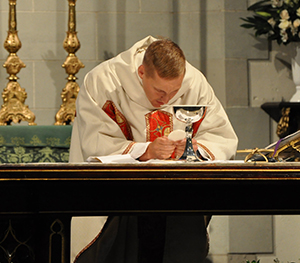Yesterday, I went to see the Martin Scorsese film,
Silence. It chronicles the lives of two Jesuit missionaries in Japan and the underground Christian community that sheltered and followed them during a period of intense persecution in the seventeenth century. I will do my best not to spoil the film for those who are planning to see it, but I would like to reference a couple of scenes in light of today's commemoration of the Confession of St. Peter.
With the priests' arrival, the people can once again celebrate the Eucharist and receive absolution for their sins after many years of being on their own. Their yearning for the smallest sign of nourishment for this faith was palpable--the gift of one bead from the priest's rosary was considered an inestimable gift of holiness, a pearl of great price. Their joy over the appearance of the
padres was infectious; and at times, I got lost in their emotion, making the sign of the cross or mouthing the responses in the darkened theater, forgetting that I was watching a film, rather than participating in a moment of grace. But then I'd catch myself, and sheepishly return to my limited role as spectator. I was moved by the sincerity and intensity of their piety; it summoned memories of my own swelling emotion and devotion as a new convert not too many years ago. Perhaps that's why I was so easily sucked into the story.
The film also paints the devastating effects of the authorities' coercion of these Christians, driving them to apostasize in order to avoid torture and martyrdom. As the terrified faithful weigh whether to step and spit on an image of Jesus to avoid drowning and burning at the stake, one easily recalls Peter's three-fold denial of Jesus. And of the Church's earliest martyrs. The film's graphic depiction of human suffering inspires profound humility, for how many of us, one wonders, could endure as much? Is there a point beyond which an apostate Christian is beyond God's forgiveness? As priests responsible for the well-being of a vulnerable flock, what is the right thing for Fr. Rodrigues and Fr. Garupe to do: apostasize to save the people from torture and death or continue to profess the faith and watch them suffer and perish? It is a morally complex and untidy film that deliberately raises questions that foster uneasiness on many levels, both theological and pragmatic. Scenes of crippling guilt and sorrow, followed by confession and absolution punctuate the film. Relationships get repeatedly ruptured and repaired, with little resolution or clarity.
 |
| The Denial of St. Peter, G. van Honthorst, c. 1622 |
Silence engages the politics of imperialism and cultural domination, as well; and I was sympathetic to the Japanese authorities' contention that the missionary work was subversive and disruptive. I was aware of my postmodern discomfort around the missionaries' claims that the Christian faith was the only source of truth or divine revelation, while also holding fast to my conviction that Christianity is a faith with unique and valid truth claims that we are urged to spread. Evangelism is part of our call to follow Jesus. It continues to be a timely dilemma. At what point does evangelism become disrespectful and invasive? How are evangelism and proselytism different and similar? How does one remain respectful of a different cultural and religious tradition while still commending the value of one's own, especially if one is an outsider?
Finally,
Silence stirred in me a renewed awareness of the current persecution of sister and brother Christians around the world: in Pakistan, in Nigeria, in China, in Palestine. Scorsese's film reminded me that the plight of St. Peter, the early martyrs, the seventeenth-century martyrs of Japan, and Christians living under persecution now is largely the same. Christians worshiping in secret and hiding any signs of their faith--a crude cross made out of straw, or the image of a saint, or a Bible--is not merely an artifact of our early history, but the daily reality of many Christians around the world, which we often forget about in our own privileged contexts. Freedom of religion or conscience is not a universal benefit enjoyed by everyone.
In fact, the Church was built (and continues to be built) upon the bodies of St. Peter and the martyrs, on those who make sacrifices of many kinds to profess Jesus as the Messiah. On this day, when we remember Peter, the rock on whom Jesus built his Church--for all of his apostasy--may we pray for all of the martyrs and confessors who suffer for proclaiming Jesus as their Lord and Messiah. May the Angels receive them into Paradise, into the everlasting rest of God.
Abundant blessings,
Fr. Ethan+









